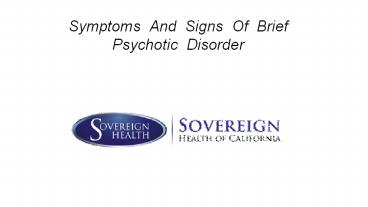Symptoms And Signs Of Psychotic Disorder - PowerPoint PPT Presentation
Title:
Symptoms And Signs Of Psychotic Disorder
Description:
Symptoms of brief psychotic disorder are temporary and symptoms last less than one month. This disorder is characterized by the sudden onset of symptoms such as hallucinations, delusions, catatonia. – PowerPoint PPT presentation
Number of Views:78
Title: Symptoms And Signs Of Psychotic Disorder
1
Symptoms And Signs Of Brief Psychotic
Disorder
2
Brief psychotic disorder is the short-term
experience of psychotic symptoms, including
hallucinations (feelings sensations, hearing or
perceiving other sensations that are not actually
there) and delusions (false beliefs). Symptoms of
brief psychotic disorder are temporary and
symptoms last less than one month. This disorder
is characterized by the sudden onset of symptoms
such as hallucinations, delusions, catatonia
(disorganized thinking), irregular speech and
language, problems with memory, disorientation or
confusion, poor decision-making and changes in
eating or sleep habits.
3
Psychotic disorder types
- There are three different types of brief
psychotic disorder that commonly occur. The first
type, called brief psychotic disorder with
obvious stressor or brief reactive psychosis, can
occur shortly after a traumatic event or major
stressor, such the death of a loved one or a
natural disaster. This disorder may also occur
without an obvious stressor. When there is not an
apparent stressor or traumatic event that has
triggered the symptoms it is considered brief
psychotic disorder without obvious stressor.
4
Causes of Psychotic disorder
- Brief psychotic disorder may have a genetic
component as it occurs most often in families
with mood disorders. People may also be more
likely to develop brief psychotic disorder due to
inadequate coping skills or among those who have
personality disorders. Brief psychotic disorder
does not occur often, but is more likely to occur
in young adults and females. Blood tests or brain
imaging may help detect the disorder.
5
Symptoms Of Psychotic disorder
- People who develop symptoms of brief psychotic
disorder often have delusions, which are
incorrect beliefs that the person will continue
to have despite evidence to the contrary. The
patient also may experience hallucinations such
as seeing things that arent there, falsely
feeling the sensation of touch or may hear
voices. People with brief psychotic disorder may
also exhibit strange behaviors, may be indecisive
and have difficulty with memory and irregular
sleep and eating patterns.
6
Treatment Of Psychotic disorder
- Treatment for brief psychotic disorder often
includes psychotherapy, which will help the
client reach the root of the problem causing the
psychosis, and antipsychotic medications. The
patient will want to contact their doctor if
their medication is not having the desired
effect. The patient should be sure to follow a
treatment plan to assist them in managing their
symptoms.
7
Feel Free To Contact Us-
- https//www.facebook.com/SovereignHealth
- https//plus.google.com/Sovcal/posts
- https//twitter.com/sovhealthofca































